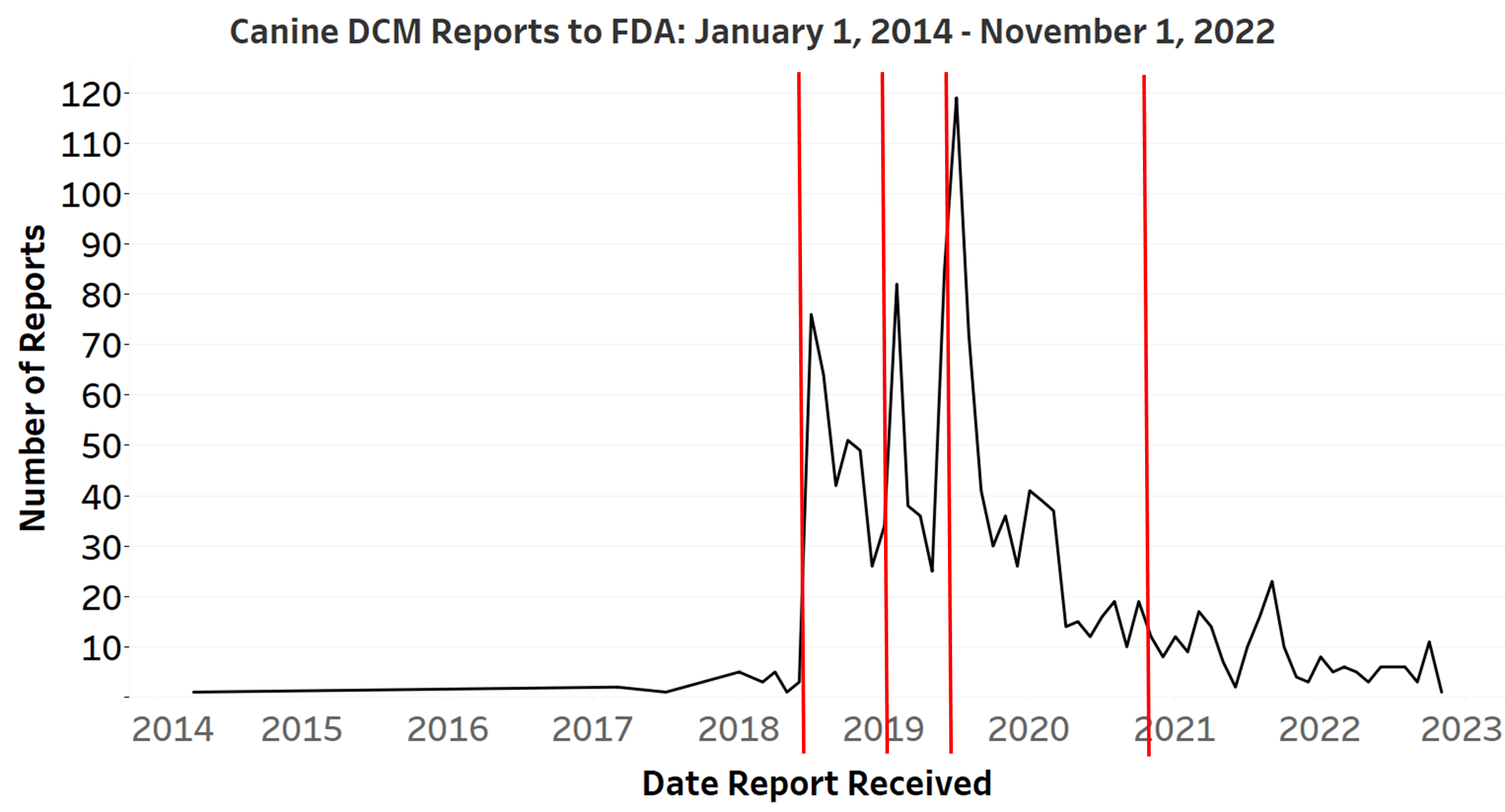BREAKING 255 Dogs Reported Sickened or Dead From Foods Linked to Fatal Heart Condition, FDA Confirms in Ultimate ‘Bad News’ Xmas Dump
In keeping with a Washington tradition of releasing embarrassing news when the fewest people are likely to notice, at 7:18 p.m. ET, hours before Christmas Eve, the U.S. Food and Drug Administration’s Center for Veterinary Medicine broke its nearly three years of silence on canine DCM — they’ve even updated the sub-section of the agency’s website dedicated to DCM – and updated the case count information on the agency’s website.
FDA Updates Canine DCM Sub-Section of Website For First Time in Years
In this case, one source of the embarrassment, no doubt, had to do with the FDA’s explanation for why, more than two years ago, it began been protecting farm industry stakeholders whose sales of crops highly concentrated in foods identified by the FDA in three major warnings in 2018 and 2019 suffered substantial revenue losses. The USA Dry Pea & Lentil Council and the American Pulse Association, for example, are trade groups which “represent the dry pea, lentil, dry bean, and chickpea industry,” and it was this sub-sector of agriculture – the pulse industry – which appears to have complained more than any other special interest group to congress.
Responding to The Canine Review’s Freedom of Information Act request FOIA 2022-995, the agency wrote:
In Response Refer to File: FDA FOIA 2022-995
Emily J. Brill (Via email: emily@thecaninereview.com) The Canine Review
Dear Ms. Brill,
The Food and Drug Administration (FDA) has completed processing your request for records under the Freedom of Information Act for FOIA request 2022-995. You agreed to narrow your request to the number of suspected or diagnosed canine DCM submitted to the FDA since April 2019. This information is now available online at:
Questions & Answers: FDA’s Work on Potential Causes of Non-Hereditary DCM in Dogs
FDA Investigation into Potential Link between Certain Diets and Canine Dilated Cardiomyopathy
On its website, which has not been updated since July 2020, the FDA has now added an explanation for its update. The agency did not mention The Canine Review’s FOIA or the many emails from communications officers stating only that the agency had not otherwise intended to update the website because the information is “not relevant.”
Here, in italics, is the agency’s explanation for tonight’s canine DCM update, the first in years:
Over time, FDA has published information about the number of reports the agency has received. These communications have varied in their content – sometimes including cats, as well as dogs, or only including those reports that FDA had confirmed with records from a veterinary cardiologist. In December 2022 as part of a routine update to Congress, FDA compiled information on canine DCM reports submitted to the agency. FDA has opted to share that information here for public awareness.
The Numbers:
Even With An Information Blackout and campaign to silence veterinary academics, 255 new cases have been reported
It should come as no surprise that less pet owners reported cases as more time passed from when the FDA stopped reporting on them, thereby allowing the FDA’s 2018 and 2019 warnings to fade. Even the FDA acknowledges in a footnote to this new FOIA-generated report, “It is typical for FDA to receive a short-term increase in reports after issuing public updates on a pet health issue. In this case, upticks in the number of DCM reports to FDA tend to happen after FDA issues public updates on the DCM issue.
The graph shows the number of reports submitted to FDA since 2014 and indicates the dates on which FDA issued public updates on the investigation. The table that follows shows the number of reports of DCM in dogs submitted between previous public communications from FDA, up to November 1, 2022.
Here are the actual number of reports submitted to FDA of DCM in dogs, as shown in this graph:

Thus, even with minimal public awareness of DCM, there were still 255 such reports.
And now that we’ve forced out a new report amid a groundswell from our readers eagerly awaiting it and keenly attuned to the issue, the sad reality is that the next set of data and records –which we will now demand.
Here’s more from the FDA’s Christmas Eve release:
FDA: This Data is Not Important
The FDA added this explanation to the numbers is provided, which seems to be an attempt to minimize the significance of its own data:
In human illness investigations, FDA works in concert with the Centers for Disease Control and Prevention (CDC) and state boards of health, which collect and track cases of foodborne illness. Unfortunately, there is no equivalent for pets, which means that it is difficult to accurately evaluate the scope of an animal disease. For instance, FDA is unaware of any statistics on the background rate of non-hereditary DCM in dogs. Reports to FDA are voluntary and likely do not reflect the true incidence of the disease in the population.
FDA continues to encourage research and collaboration by academia, veterinarians, and industry. FDA reviews all reports received as part of our ongoing surveillance efforts related to pet food safety. However, due to resource constraints the agency is not able to follow up or provide updates on each report.
FDA: No, We’re Not Going to Name Brands
No, we are not planning to update the commonly reported brands, as we are aware that several pet food companies have adjusted diet formulations since our initial announcements about DCM. We have asked pet food manufacturers to share diet formulation information, which could substantially benefit our understanding of the role of diet in these cases. We continue to encourage pet owners to discuss their animals’ diets with their veterinarians.
Number of reports submitted to FDA of DCM in dogs* †
| Jan. 1, 2014 – Nov 30, 2018 | Dec 1, 2018 – Apr 30, 2019 | May 1, 2019 – July 31, 2020 | Aug 1, 2020 – Nov 1, 2022 | Total: Jan 1, 2014 – Nov 1, 2022 |
|---|---|---|---|---|
| 329 | 190 | 608 | 255 | 1,382 |

